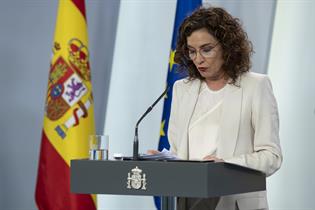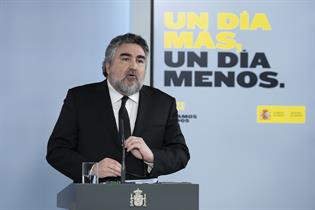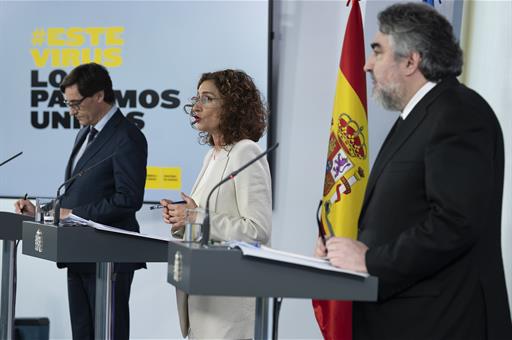Council of Ministers. Coronavirus COVID-19
Government to request fourth extension of state of emergency and activate guarantees worth 24.5 billion euros for companies and self-employed
Council of Ministers - 2020.5.5
Moncloa Palace, Madrid
The Council of Ministers agreed to ask the Lower House of Parliament for authorisation to extend, until midnight on 24 May, the state of emergency decreed on 14 March to manage the health crisis caused by COVID-19. The President of the Government, Pedro Sánchez, will appear before the Lower House on Wednesday.
The Minister for the Treasury and Government Spokesperson, María Jesús Montero, argued that the extension still remains an "essential and necessary" tool to consolidate the results achieved in recent weeks.
María Jesús Montero pointed to the improvements in the figures, both at an epidemiological and at a health level, achieved thanks to the efforts made, the discipline in the lockdown and the compliance with the individual protection and hygiene measures by Spanish society, whom she asked to continue maintaining precautions because there is still no vaccine or effective treatment available against the disease.
 Pool Moncloa/Borja Puig de la BellacasaThe Minister for Health, Salvador Illa, also considered it essential to keep the state of emergency in force during the de-escalation phase to continue combating the coronavirus, and argued that "now is not the time to commit to experiments when we have an instrument that has proven to work" and whereby there is "no alternative".
Pool Moncloa/Borja Puig de la BellacasaThe Minister for Health, Salvador Illa, also considered it essential to keep the state of emergency in force during the de-escalation phase to continue combating the coronavirus, and argued that "now is not the time to commit to experiments when we have an instrument that has proven to work" and whereby there is "no alternative".
The minister highlighted that the existence of common rules, that have been met "on an exemplary basis" by the Spanish people, and restrictions on mobility - the first vector of contagion - are what have led to the spread of infection now dropping to 0.4%, having stood at close to 35% per day in the first few weeks.
The minister stated that all developed countries, such as Spain, that are characterised by high levels of movement of people, are precisely the countries that have been hardest hit by this global pandemic. "The United States, France, Italy and the United Kingdom are all using similar or identical instruments to the state of emergency, both in the lockdown phase and in the de-escalation or transition phase towards the new normality", he claimed.
Salvador Illa recalled that the priority is health and that this should not come into conflict "with economics or politics", and hence advocated continuing to govern the situation with caution and prudence, "which has been the roadmap since the outset by the Government of Spain".
Target: to maintain the figure of new infections below 1%
The health target for this eighth week of the state of emergency is to maintain the increase in new infections below 1%. "The figures we are seeing are in line with this figure", said Salvador Illa. Yesterday, there were 887 new infections, an increase of 0.4% on the number of cases declared the previous day; 185 people died - the minister expressed his deepest sympathies to their loved ones - and 2,143 people recovered from the disease.
The Minister for Health, on Hand Hygiene Day on 5 May, encouraged citizens to frequently wash their hands as a standard habit and to continue respecting social distancing measures.
Third tranche of ICO guarantees for lines of credit
 Pool Moncloa/Borja Puig de la BellacasaThe government has activated the third tranche of the Official Credit Institute (Spanish acronym ICO) guarantees for lines of credit for the sum of 24.5 billion euros to guarantee the liquidity of companies and the self-employed.
Pool Moncloa/Borja Puig de la BellacasaThe government has activated the third tranche of the Official Credit Institute (Spanish acronym ICO) guarantees for lines of credit for the sum of 24.5 billion euros to guarantee the liquidity of companies and the self-employed.
The Minister for the Treasury specified that 10 billion euros will be released to guarantee loans for the self-employed and SMEs, and another 10 billion euros to guarantee loans to larger companies. A tranche of 4 billion euros will also be allocated to guaranteeing the issue of commercial paper by non-financial companies that operate in the Fixed-Income Market. Another 500 million euros have been made available to strengthen, by up to 80%, the guarantees granted by the Spanish Counter-guarantee Company (Spanish acronym: CERSA).
María Jesús Montero highlighted that the agreement expressly provides that banking institutions may not add any financial cost onto the credits granted. The government, she said, will monitor that companies benefitting from the guarantees use the financing obtained to tackle their liquidity needs and not to distribute dividends.
Among the conditions to be granted these guarantees, the Government Spokesperson highlighted that the obligation is established for these companies to have their head office in Spain.
María Jesús Montero specified that the State has released some 64 billion euros under lines of credit to guarantee the liquidity of companies and the self-employed approved by the government on 17 March for a total amount of 100 billion euros. "The priority of protecting our productive fabric is paying off", she said.
The Government Spokesperson quoted by way of example that by last Monday 269,843 operations had been agreed, 98% of which were for SMEs and the self-employed.
Specific measures for the culture sector
 Pool Moncloa/Borja Puig de la BellacasaThe Council of Ministers approved a Royal Decree-Law to support the culture sector which establishes investments and subsidies, as well as labour and tax measures, and incentives to alleviate the harm stemming from COVID-19.
Pool Moncloa/Borja Puig de la BellacasaThe Council of Ministers approved a Royal Decree-Law to support the culture sector which establishes investments and subsidies, as well as labour and tax measures, and incentives to alleviate the harm stemming from COVID-19.
The Minister for Culture and Sport, José Manuel Rodríguez Uribes, explained that the main inspiration behind the text has come from "the commitment not to leave anyone behind", attention to the specific nature of the culture sector and the assertion that culture is "a pillar of the social and democratic State under the rule of law and its preservation values".
In order to guarantee the liquidity of cultural companies, explained José Manuel Rodríguez Uribes, the Ministry of Culture and Sport will inject 20 million euros into the mutual guarantee society CREA SGR, which will allow loans to be guaranteed for the sum of 780 million euros. In addition, measures have been established to support and protect the business fabric and associations, and tax breaks have been introduced, particularly in relation to patronage to stimulate private participation in culture.
As regards the protection of workers in cultural industries, who, due to the intermittent nature of their contracts, have not been protected by other mechanisms implemented to date, they have been provided with an extraordinary unemployment benefit.
Furthermore, the deadlines have been extended for major events planned as Events of Exceptional Public Interest, such as Xacobeo Year 2021, the Tokyo Olympic Games and Paralympics, and others have been included such as the Berlanga Plan, set up on the occasion of the centenary of the birth of the filmmaker; the Alicante 2021 Ocean Race and the presence of Spain as the Guest of Honour at the Frankfurt 2021 Book Fair.
The minister highlighted that the content of the decree ranges from cinema and the performing arts to fine arts, books, videogames and sporting events, and thanked the key work and contributions from the teams at the Ministry of Culture and Sport and other ministerial departments, regional governments and regional culture departments, the Spanish Federation of Municipalities and Provinces (Spanish acronym: FEMP) and associations and representative bodies in the sector.
José Manuel Rodríguez Uribes reiterated his intention to continue down this line of dialogue to forge a State Pact for Culture that allows measures to be established in the medium and long term after the de-escalation.
Reform of university fees
The government also agreed to repeal the current pricing system for enrolment at public universities, implemented in 2012.
María Jesús Montero argued that this system caused the average price of university loans to rise by 17%, thus "seriously prejudicing students", particularly those most vulnerable economically.
The government, announced the Government Spokesperson, will reduce the rates this year to enrol in the first year of undergraduate studies, and will work with all regional education departments to gradually reduce other rates for bachelor's and master's degrees.
Other agreements
- The government restates and clarifies insolvency legislation
- The government lifts the suspension established in the decree on the state of emergency in order to resume public works tenders
- The government approves an institutional statement on the occasion of the anniversary of Spaniards deported and killed at Mauthausen and in other concentration camps and other victims of the Nazi regime in Spain.
Non official translation





